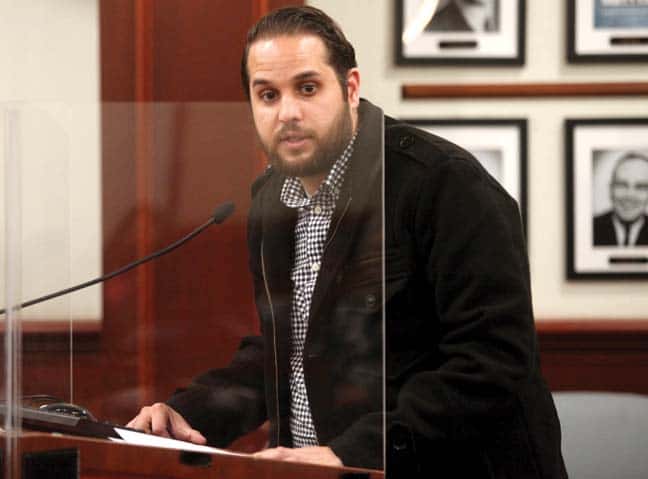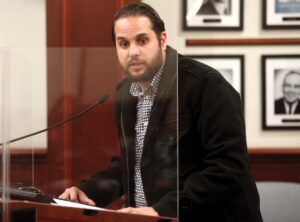Motel ordinance clears key hurdle

New Motel 6 general manager Ali Jaffrey speaks during Tuesday’s planning commission meeting. The commission voted 6-0 to advance a draft motel ordinance to the City Council. Courier photo/Steven Felschundneff
by Steven Felschundneff | steven@claremont-courier.com
The lengthy process to effectively update the city’s hotel and motel ordinance appears to be on its way to becoming the law of the land after the Claremont Planning Commission signed off on the latest version and sent it to the City Council for approval.
By a 6-0 vote, with one commissioner absent, the panel ratified a slightly tweaked ordinance that had been hammered out during a marathon six-hour joint meeting between the planning and police commissions on January 28.
Residents in the south part of town have for years been asking the city to draft a motel ordinance aimed at curbing what they describe as rampant sex work and criminal activity surrounding Motel 6, Claremont Lodge, and the former Knights Inn, now known as the University Inn, which are all located near Indian Hill Boulevard and the 10 Freeway.
However, a version of the motel ordinance the city presented to the planning commission last fall was met with widespread disappointment from residents who found the proposal too weak and felt it favored motel owners and managers.

New Motel 6 general manager Ali Jaffrey speaks during Tuesday’s planning commission meeting. The commission voted 6-0 to advance a draft motel ordinance to the City Council. Courier photo/Steven Felschundneff
In October the commission agreed with the residents’ assessment and directed the city to do more work, culminating in January’s combined meeting, during which the two commissions and the public systematically worked out a set of priorities from which the final draft ordinance could be penned.
With Tuesday’s unanimous vote, the draft ordinance is scheduled to be on the City Council’s March 14 agenda. If the council makes no changes to the ordinance it would receive a second reading on March 28 and go into effect 30 days later.
“The general purpose of these regulations is to address nuisance activity that often occurs in and around hotels/motels and use a collaborative approach to both proactively prevent and, when necessary, reactively abate the activity,” read the introduction to the draft ordinance. “The intent is to promote the health, safety, comfort, convenience, prosperity, and general welfare by requiring that businesses that offer shelter to visitors, transient guests, and other residents provide a minimum level of cleanliness, quality, and security.”
Among the new rules, a prospective guest would have to present valid government identification and a credit or debit card before checking in. An employee would then visually verify that the card belongs to the guest. A credit card verification would still be required even if the guest pays for the room with cash.
The motels would be required to maintain a register with detailed guest information, keep those files for four years, and allow city officials to inspect the records.
Management would have to issue parking permits that must be displayed on the dashboards of guests’ cars. Visitors would also have to obtain a permit.
Common areas, including parking lots and hallways, would be required to be monitored with closed circuit television cameras that have the ability to record. The recordings would need to be retained for 90 days and be available for inspection.
To maintain sanitation, management would be required to have a daily cleaning schedule that includes removing trash from guest rooms. The commission added the rule that linens should be changed every three days, even if a guest does not vacate the room, and linens and towels must be replaced with clean items when occupancy turns over.
In order to prevent any hotel or motel from becoming someone’s permanent address, the ordinance left intact a rule currently on the books stating that no one can stay in the same room for 30 consecutive days, or 60 days in a 180-day period. In addition, minimum stays at the motels would be 18 hours.
Eliminated from the code were old rules stating rooms cannot have kitchens and one stating that extended stay hotels must be “located in an area with a concentration of amenities.”
The commission also removed a stipulation that management had to wait until the entirety of a guest’s original reservation had expired before the room could be re-rented. For example, if somebody booked an entire weekend but left on Saturday the motel would have to wait until Monday to book another guest in that room. This limitation was removed and replaced with the stipulation that the room could be re-rented once the minimum length of stay had expired.
The detailed full proposed ordinance can be viewed on the city’s website.
With the understanding that each motel or hotel will have its own business model, the ordinance leaves the door open for managers to receive a variance from certain rules through the conditional use permit process. Only select provisions in the code could be avoided through this process, like the minimum and maximum stay limits. Other rules including the credit card requirement and guest register are not subject to modification by motel owners.
The rules require management to make certain records, and even the rooms, available for inspection by city personnel.
According to city attorney Alisha Patterson, traditionally motel managers have voluntarily made records and rooms available to the city, and in the case of potential criminal activity a search warrant signed by a judge can be obtained fairly quickly. The language in the ordinance includes something called an “administrative search,” which Patterson described as being a fairly routine request under which the city would give management ample advance warning.
The new general manager of Motel 6, Ali Jaffrey, voiced general support for the planned ordinance during public comment and listed some of the things he is doing to correct resident complaints about the property and its clientele.
“There are always issues at hotels and motels,” Jaffrey said. “At our property at the moment we are making sure we are abating crime as fluidly as possible. We are complying with police officers. There have been undercover stings at our property and we are working with just about anything we can get from the city.”
“We are reacting to something that has gotten much worse in the last two and-a-half years,” Claremont resident Jim Keith said. “I am very happy to see that it’s getting better in the last couple of months but it’s not gone, there are incidents still happening, and what is to stop it from returning? That is what the ordinance is doing.”
Jaffrey has been on the job for about four months and said he has already implemented some of the measures in the ordinance such as the credit card requirement and issuing parking passes. He also keeps a detailed guest register.
“I think they are on the right track [with the ordinance],” Jaffrey said after the meeting. “Some of the stuff in there it could be a little more open to business practices, but all in all they have done their job.”
During the joint meeting in January, Andrew Behnke, general manager of the DoubleTree by Hilton Hotel Claremont said the previous general manager at Motel 6 was paid under the table from people involved in the sex work industry and that staff at the DoubleTree received a phone call from a person asking if they would be interested in a similar “arrangement,” which the staff refused.
Asked about those payments Jaffrey said, “I can’t really comment on that, that was before [my time.]”
Anyone who would like to voice an opinion about the motel ordinance can do so at the 6:30 p.m. March 14 Claremont City Council meeting at city hall.









0 Comments